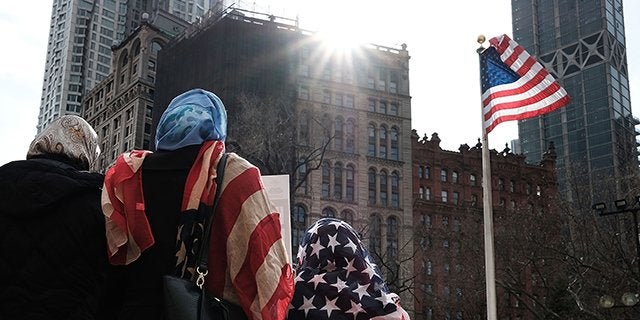
Pew Study: U.S. Muslims Feel Unwelcome Yet Hopeful
There can be little debate that the election of Donald Trump has disparately impacted millions of women, Latinos, people with disabilities, the LGBT community and many more. Additionally, there are millions of American Muslims who have also felt the rhetorical and political brunt of Trump’s bluster. To that end, the Pew Research Center released a 192-page report on their 2017 survey on American Muslims which is quite illuminating in showing how millions of Muslims view themselves within the social tapestry of American society today.
This major July 2017 Pew study highlighted the attitudes of 1,001 American Muslim respondents after they conducted 40,987 calls in languages including English, Arabic, Farsi and Urdu. Overall, this major six-month survey found that Muslims were generally quite happy with their individual lives here as Americans; but they were profoundly concerned about how Muslims were currently viewed by our elected leaders and greater society as a whole today at the national level.
Some of the key findings include from this July 2017 report include almosttwo-thirds of Muslim Americans (64%) felt dissatisfied with the way things are going in the U.S. today and nearly three-quarters (74%) say Donald Trump is unfriendly toward Muslims in America. To illustrate the real-life impact of Islamophobia on the lives of everyday Americans, this study also found that nearly half (48%) of American Muslims said that they have personally experienced at least one incident of discrimination within the past 12 months alone and over 50% of Muslims feel like it is more difficult to be Muslim in America in general today.
One of the most telling findings was that 75% of Muslims think there is a lot of discrimination (or Islamophobia) in America today even though the Pew study also found that “alongside these reports of discrimination, a similar – and growing – share (49%) of Muslim Americans say someone has expressed support for them because of their religion in the past year”. They also noted that 55% of Muslims think Americans in general are friendly toward U.S. Muslims, compared with just 14% who say they are unfriendly.
“On the one hand, this latest Pew report confirms what should be obvious; Muslim Americans have experienced more discrimination since Donald Trump has assumed the presidency,” Georgetown University Professor John Esposito told me in an interview. “This is not surprising when one remembers Trump’s infamous statement to CNN’s Anderson Cooper that‘Islam hates us’ or his proposed Muslim Ban or numerous members of the Trump cabinet and/or White House who say Islam is not a religion but a dangerous political ideology and that Muslims should not be trusted and cannot be loyal Americans.”
Even in the face of societal marginalization, this latest Pew study still found that U.S. Muslims express pride in their religious and national identities simultaneously. Over 95% of respondents agreed with the statement, “I am proud to be Muslim” and nearly as many (92%) said that they agree with the statement, “I am proud to be an American.” In total, nearly 90 percent agreed with both statements, saying that they are both proud to be Muslim and proud to be American which should destroy any misguided notion that Muslims are not proud Americans as well.
“Despite Muslim Americans reporting that it has become harder to be a Muslim in America,” Professor Esposito continued during our interview. “The overwhelming number of Muslims polled- 9 out of 10 Muslim Americans- believe in the American dream and see themselves as part of our society.”
As a group, this study found that Muslims are younger and more racially diverse than the general population at large. The Pew study highlighted that over 60% of Muslims in America are currently under the age of 40; with Generation X and millennials representing major cross-sections of Muslims living in the United States today.
Looking into the future, even though this latest Pew Research Center study showed that over 47% of American Muslims personally faced Islamophobic discrimination in the last year; this report also clearly showed that American Muslims believe in the United States and that we will continue to persevere like other disenfranchised minority groups who have contributed to the social fabric of America even in the midst of xenophobic bigotry.


 Search
Search